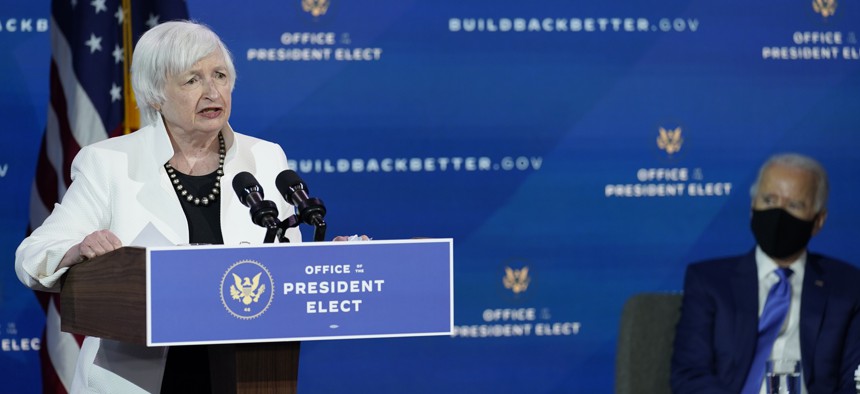Treasury Nominee Voices Support for State and Local Relief Funding

President-elect Joe Biden, right, listens as Janet Yellen, who Biden nominated to serve as Secretary of the Treasury, speaks at The Queen theater, Tuesday, Dec. 1, 2020, in Wilmington, Del. AP Photo/Andrew Harnik

Connecting state and local government leaders
Janet Yellen also said during a confirmation hearing that a cap on the federal deduction for state and local tax payments should be studied more before any changes are made to the policy.
The federal government will need to “act big” to address the financial fallout from the coronavirus pandemic and efforts should include funding for state and local governments, said Treasury Secretary nominee Janet Yellen during a Senate confirmation hearing Tuesday.
Acknowledging the country’s growing debt burden, Yellen told the Senate Finance Committee that the benefits of funding a robust recovery plan “will far outweigh the costs.” She also suggested that it would not be a good time to withhold funding from states and localities.
“Over the next few months, we are going to need more aid to distribute the vaccine; to reopen schools; to help states keep firefighters and teachers on the job,” Yellen said during her opening remarks. “We’ll need more funding to make sure unemployment insurance checks still go out; and to help families who are at risk of going hungry or losing the roof over their heads.”
Job losses and revenue declines at the state and local level were a “tremendous drag on the economy” following the 2008 recession and will be again as the United States recovers from the pandemic, Yellen added.
President-elect Joe Biden, who is set to be sworn in Wednesday, has proposed a $1.9 trillion recovery plan that includes $350 billion in direct aid for state and local governments.
Local governments have sustained significant job losses—due to layoffs, furloughs and hiring freezes—over the course of the pandemic, particularly in education.
Yellen, a labor economist who chaired the Federal Reserve from 2014 to 2018, was quizzed Tuesday about her stance on a wide range of economic policies that could be taken up by the Biden administration—from raising the federal minimum wage to $15 an hour, to repealing a cap on state and local tax deductions.
The sweeping tax overhaul Republicans pushed through in 2017 limited the amount of state and local tax payments that individual taxpayers could claim on their federal tax returns to $10,000.
State and local government groups fought that policy change, arguing it amounted to double taxation and would make it harder for states and localities to impose and raise their taxes to help pay for projects and services. Elected leaders from Democratic-leaning states with higher taxes, including New York, New Jersey and California, have complained that the “SALT” cap unfairly targeted their taxpayers and have advocated for its repeal.
Democrats pursued a repeal of the SALT cap in their coronavirus relief package.
When asked by Sen. Chuck Grassley, the Republican chairman of the committee, whether the repeal should be included in coronavirus relief legislation, Yellen declined to endorse a specific approach and said more study of the issue was warranted.
“Before making a decision about what should be done going forward, I think it is critical to study and evaluate what the impact has been on state and local governments and their ability to provide critical services,” she said. “I promise to work with those in Treasury and throughout the administration on evaluating what impact that has had on states and local governments, households and small businesses.”
Sen. Ron Wyden, the Oregon Democrat set to take over leadership of the committee when Democrats take the reins of the Senate, asked Yellen what economic policies “will give Americans the biggest bang for the buck.”
Yellen said economic relief to those in the greatest financial need, such as through unemployment insurance and food stamp benefits, and aid for small businesses would have the best chance at providing relief and improving the economy.
Andrea Noble is a staff correspondent with Route Fifty.

NEXT STORY: Biden Plan Would Direct $400 Billion to Vaccine, Public Health Initiatives




